7-Imp’s 7 Kicks #770: Featuring Nikkolas Smith
 November 21st, 2021 by jules
November 21st, 2021 by jules
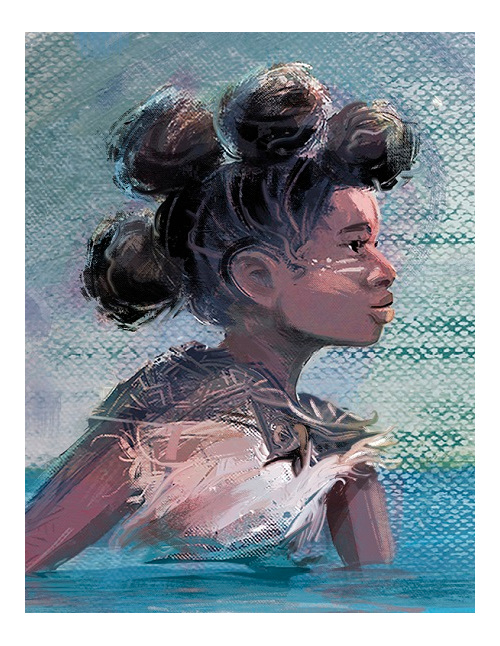
It has been troubling to me to see the number of news stories about states (including mine) passing legislation to ban discussions in classrooms and libraries that address the racism that is very much a part of America’s past — and present. This has a huge effect on the books that are then shared in classrooms. As you can read here, the people going after critical race theory are engaging in overexaggerations of what it really is. We will never progress with regards to racial equality in this country without giving students truthful accounts of our country’s racist past and present, and giving young people the skill set to critically examine how systemic racism has and continues to shape this country is but one step toward that progress.
Cue Nikole Hannah-Jones’s The 1619 Project. You may be familiar with its New York Times’s and/or podcast iterations, and now it’s in book form. (I haven’t read it yet, but it’s on my holiday wish list.) Hannah-Jones also joined Renée Watson to pen the powerful picture book The 1619 Project: Born on the Water (Kokila, November 2021).
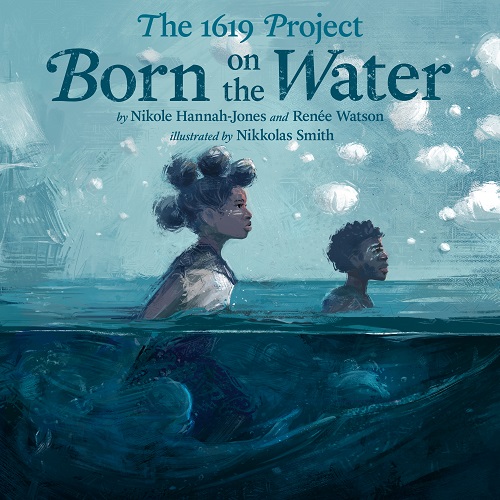
The story here, constructed as a series of free verse poems, is framed with that of a young Black child whose teacher has asked the class, in the form of an assignment, to trace their roots. “I do not know where I begin, what my story is,” she thinks, feeling ashamed. But then she talks to Grandma, who tells the child (with the family gathered around) about their people:
They say our people were born on the water,
but our people had a home, a place, a land
before they were sold.
Five bustling, full-bleed spreads capture their ancestors, living with joy, in the Kingdom of Ndongo in West Central Africa. We read about their society, their work, their play, their language (Kimbundu), and much more. Smith’s illustrations here are especially mesmerizing; he plays with light, shadow, movement, and perspective in compelling ways. The “And They Danced” spread — the second spread below, sans text — is worth the price of admission alone.
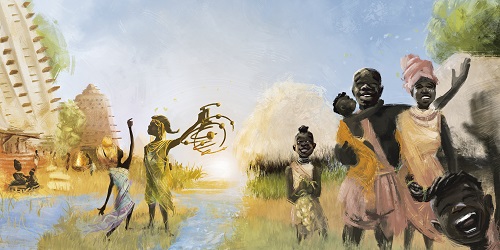
(Click spread, pictured here sans text, to enlarge)
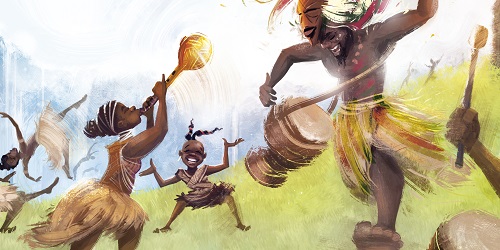
to the melody of horns and stringed instruments,
of marimbas and drums. / They danced to celebrate, to mourn,
They danced as a way of worship, to offer thanks.
Their bodies a song under open sky and bright sun.
Their bodies a swaying testament to the beauty of creation.”
(Click spread, pictured here sans text, to enlarge)
In a dramatic shift in tone, we meet the entry named “Stolen.” The writing here is piercing, brutally honest: “Ours is no immigration story.” Here, Smith’s palette darkens considerably, as a line of people are forced to set sail to “a ‘New World’ / they had no desire to see.” The spread at the book’s center is particularly striking in its wordlessness: Smith’s ragged lines convey the ship, devouring the spread, as we see it sail on the water. The cumulative effect of this authentic shift in tone is that of leaving the reader feeling rather breathless.
The authors don’t hold back: We read about those who “could not bear the pain” and those who “tossed themselves / into the teal eternity of the Atlantic Ocean.” We follow to Virginia those who survived. It’s 1619. We read about their backbreaking work in tobacco fields, and we see their attempts to hold families together, find joy, make it a home: “We will survive because we have each other.” We read about William Tucker, born to Anthony and Isabella: “They did not know / their family would be / the start of a new people. … The first Black child born in the land / that would become the United States. / The first truly American child.” We read about resistance. We read about the legacy of those who “passed on their stories / through the stitch of a quilt, / shared secret messages through songs.”
As the Publishers Weekly review notes, this book details the specifics of an “often-obscured history and its effects” and reminds readers that “Black history is not a story of slavery and suffering but one of perseverance and hope.”
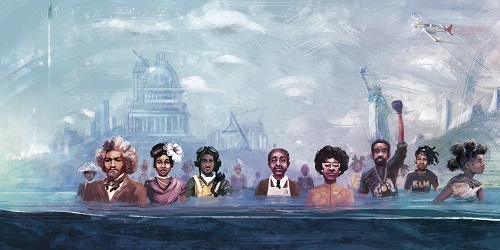
The people fought. …”
(Click spread, pictured here sans text, to enlarge)
In this September piece at Essence, Watson is quoted as saying:
I think we do all children a disservice by selecting which parts of history they can learn about. I hope the young people reading this book become citizens of the world who are critical thinkers and empathetic change makers. I think there’s something powerful about a child understanding the world they’ve inherited and asking them to dream of the world they want to live in.
What she said.
You can head here for a CRT “toolkit” so that “we can support teachers as they teach about all facets of American life – and encourages students to think critically and learn honestly and work towards an inclusive, diverse, and better future.”
THE 1619 PROJECT: BORN ON THE WATER. Copyright © 2021 by The New York Times Company. Illustrations reproduced by permission of the publisher, Kokila, an imprint of Penguin Random House LLC, New York.
Note for any new readers: 7-Imp’s 7 Kicks is a weekly meeting ground for taking some time to reflect on Seven(ish) Exceptionally Fabulous, Beautiful, Interesting, Hilarious, or Otherwise Positive Noteworthy Things from the past week, whether book-related or not, that happened to you. New kickers are always welcome.
1) The color of the leaves right about now.
2) Long walks.
3) Dinner with friends.
4) Tickets for January to see Patty Griffin. (First live show since the pandemic for me.)
5) Star Trek: Discovery is back. Which means Grudge is back!
6) This poem from Kate Baer.
7) I’ve heard so many 60-second “I Don’t Think So, Honey!” rants on the podcast from Bowen Yang and Matt Rogers (Las Culturistas) that I found myself wanting someone to time my own rant the other day.
What are YOUR kicks this week?

This book and 1619 is on my list. And this quote: “Black history is not a story of slavery and suffering but one of perseverance and hope.”
Jules, that poem rocks. Our leaves are letting go and the color is waning.
My kicks:
1. Celebrating oldest grand’s 17th birthday.
2. Oldest grand’s humor.
3. Finished The Personal Librarian.
4. Two nights at the coast.
5. Writing.
6. Prepping for 2nd grade poetry lesson tomorrow.
7. Talking with the poetry community last Monday.
Have a wonderful week.
Jone, happy birthday to the oldest grandchild! Good luck with the second graders tomorrow. I’m jealous that you saw the coast. It’s been many, many years for me, given COVID and our landlocked state.
Good morning, Imps, and Nikkolas, Nikole, and Renée. Thank you for sharing your powerful work.
Jules: I haven’t seen Star Trek: Discovery, but Grudge is automatically my favorite character.
Jone: Happy birthday to your oldest grandkid! Good luck with your lesson tomorrow.
My kicks from the past week:
1) Warm meals
2) Elbow’s new album
3) Making time for myself
4) Movies
5) Movement
6) Breathing more easily
7) Space
These illustrations are stunning and powerful, what a perfect book for this week.
Jules – yay for upcoming concerts, long walks and dinner with friends.
Jone – happy birthday to your grandgirl! Yay for trips to the coast.
Little Willow – love your kicks 1, 3 and 6 the most. Warm meals are such a great kick in colder weather, and taking time for yourself is so important and feels like flows naturally into being able to breathe more easily.
My kicks this week:
1) First woman with Presidential powers! Even if it was only for 85 minutes – history! Go Madame Vice-President!
2) King Richard was a great watch. I knew a lot of Venus and Serena’s backstory but still got caught up in rooting for them throughout the movie.
3) Tick Tick Boom was another fun watch.
4) Cowboy Bebop!
5) A Saturday hike in a local park.
6) Making plans.
7) Walks with Daisy in the moonlight.
Have a great week everyone!
Little Willow: I still haven’t had time to sit down and listen to the new Elbow album when I’m not multi-tasking (the only way to listen to it), but I hope to very, very soon. I like your sixth kick and am glad that whatever caused labored breathing (figurative or literal or both) is gone!
Rachel: Hear! hear! to your first kick. Let’s hope we get more than 85 minutes in our lifetimes. Hello to Daisy (in all kinds of light).
Have a good week, you all!
Rachel: Hi Daisy! Thank you. Tick Tick Boom made me cry several times.
Jules: Thanks! I also look forward to listening to it again when I’m not multi-tasking. It’s very gentle and sweet.